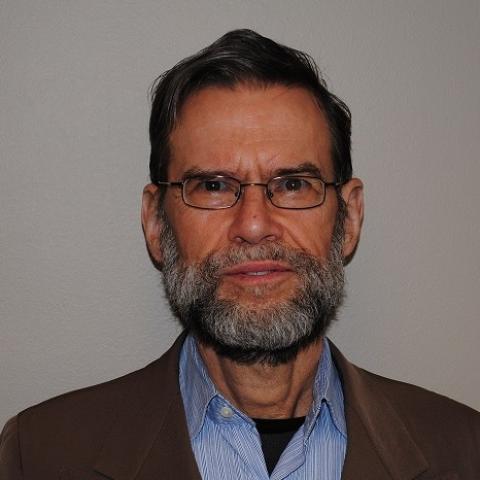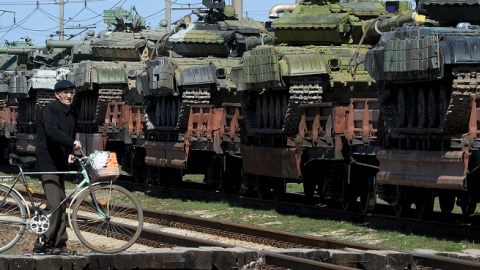What have we learned from the Russian seizure of Crimea and the Western reaction to it? President Obama seems to have learned nothing; he is more obstinate in pursuing failed policies than Jimmy Carter or Neville Chamberlain. Informed discussion of foreign policy has now expanded to include wide and valuable questioning of Obama’s indecisive, yielding tactics--and his general vision of a world without enemies. But something in the middle is still missing, and that something is important. What have we learned about the former Soviet bloc, and about ourselves?
Like France and Britain in the years between the great wars, 1919-1939, we have committed ourselves to the defense of an international order in Eastern Europe, including the former Soviet Union, that we don't really have the energy or will to defend. The two epochs are very different, of course. For all Putin’s hostility to the West and its aspirations, and despite his skillful manipulation of Russian populist sympathies, his are nothing like the volcanic energies of a Hitler or Mussolini, and his people are nothing like the eager, war-hungry Germans and Italians of that time.
Nevertheless, there remains an important historical echo of the interwar period: what the West, defender of the status quo, is actually defending, and how we are going about the task. The order that the victorious allies could effortlessly impose at Versailles depended on the temporary disappearance of half the European great powers (who were bound to come back), and on the continued cooperation and sustained will of the victors. But as America and Britain retreated from Europe, responsibility for this effort fell more and more to France--a France that was uncertain and weary deep in its bones. In short, the Great War’s victorious allies genuinely preferred their new order--just as we do the Eastern Europe left by the Soviet Collapse--but they turned out not to care about it as a fundamental matter. As a result, when an aggressor eventually challenged that order, it collapsed with astonishing speed, like a house eaten from within by termites.
In more recent decades, we committed ourselves to defend new arrangements in Eastern Europe because we treated the accidental map of December 1991--deriving from the accident of a single sentence in Josef Stalin’s 1936 Constitution, giving Union Republics the right to secede--as if it were the result of a full-scale, 1815- or 1919-style peace settlement. But the Russian view was very different: that the collapse (and wished-for partial reconstitution) of the Soviet Union was a long, historical process, just beginning in 1991, and that the initial “state-like entities” it produced--and still less the borders--would not be permanent. This Russian view was the more realistic of the two. But as a guide to Western policy it was untenable, for its adoption would have legitimized Russian and Uzbek imperialism; required passive acceptance of frightful and lengthy ethnic-cleansing campaigns; and consigned the East to chaos for decades, opening it to Islamic extremism and other corrosive hatreds.
In the early 1990s there were many establishment Western authorities who preferred that Europe create a sort of Chinese Wall separating the civilized (Protestant and Catholic Europeans) from the barbarians (Orthodox and Muslim Europeans). But we ultimately chose otherwise, expanding NATO and even the EU far to the east, often with Germany in the lead. We imagined that we could maneuver as sentiment and convenience dictated, without ever having to pay very much. And now we are getting the overdue bill, which we don’t want to pay.
In the aftermath of Crimea--and the embarrassment of our supine response--the West is beginning to see the Russian vision of the future unfold: the long historical process of incitement, rebellions real and arranged, threats, secession, recombination in new states, and outright invasions. The international “order” in Eastern Europe after 1991 reflected not what power can achieve--as peace treaties usually do--but accommodation to unforeseen events. Such an order rests very largely on habit: on the kind of action that various leaders consider “thinkable” or “unthinkable.” During the 2008 Russian invasion of Georgia (and subsequent Russian recognition of “independent” puppets South Ossetia and Abkhazia, both inside Georgia’s internationally recognized borders), the West, surprised, declined to bless the outcome as legitimate--but did nothing to stop or reverse it, either. Absent this historical precedent and example (and the similarly feeble and immediately ignored American “red line” in Syria), Crimea would probably not have been seized. Until 2008, the idea of Russia according formal diplomatic recognition to new states carved from one of its neighbors was “unthinkable” for its leaders and for us. Until earlier this year, the idea of Russia straight-out annexing a bordering nation’s territory was similarly “unthinkable.” What unthinkable thing will Putin do tomorrow? To fully shatter the order we have been defending, Putin needs only to abandon some habits, some diplomatic conventions.
Few people will say so out loud, least of all the Obama administration, but Russia is what used to be called a “revisionist” power--like Germany, Italy, and Hungary in the interwar years--in the sense that it seeks a dramatic alteration of present international arrangements and balances of power. Any careful reading of elite Russian foreign-policy discourse over the past 20 years should drive this reality home with force. And fresh Western understanding of the situation we confront post-Crimea must begin with it.
Crimea is a heady moment of triumph for Russia’s ruling elite, one that may tempt them to act more systematically on a long list of pent-up resentments. To date, there have been occasional acts of aggression but no consistent revisionist strategy. There have always been advocates of such a strategy, however; many Russian foreign policy experts like Andranik Migranyan, for example, have consistently advocated an expansionist, explicitly anti-Western strategy to “reintegrate” the former Soviet Union. Should we passively allow a situation to arise in which this policy alternative becomes more attractive? Unlike interwar Germany, Italy and Hungary, Russia’s current leaders still appear to place their own enrichment above nationalist ambition. Personal sanctions and isolation are therefore tools that have a lot of potential power--if the West applies them seriously, as we have not.
Russia also differs from the interwar revisionist powers in being very weak relative to its ambitions, or rather resentments. In this sense, it is relatively weaker even than Italy was in 1940. For his own domestic political reasons, President Obama has begun to point this out. But the relevant weakness when cross-border aggression is going on is military weakness. Except for nuclear weaponry, Putin has not greatly modernized Russia’s obsolete, corrupt, and demoralized armed forces; he is afraid of them. A major reorganization began in 2008, but as often when starting with a mess, comprehensive reform schemes have resulted in much disorganization. Russian forces don’t have much recent, major combat experience, even in counterinsurgency. A few quick, successful operations (the beginning of the second Chechnya war, Georgia 2008, Crimea) were carried out by small special forces. It is a big policy mistake to taboo discussion of the vastly different quantity, quality, and experience of Western and Russian military forces during the Ukraine crisis. Better to let the issue hang in the air.
It is already clear that neither the US nor the EU will make Russia pay a major price for invading a sovereign neighbor state. To deter another aggression, they rely on hope, instead. We hope Russia will not invade Donetsk, Kharkov, and Luhansk. But those in the West dissatisfied with this reliance--those who understand that hope alone is far from adequate--can do more than merely roll our eyes and sigh. We can loudly and explicitly identify what it is that’s gone wrong with longer-term American policy toward Eastern Europe and Russia. We can formulate a clear policy agenda to implement when the West’s present wrong one produces its next disaster. And our policy within Ukraine can still become effective.
What is most forgotten in this crisis is the uncertain fate of what we are defending: European-oriented democracy in Ukraine. Recent events should remind us that a deep and recurrent yearning for democracy exists--even in the former Soviet Union. That yearning is not always reflected by the formal political leadership that Western nations are accustomed to dealing with and advocating. Throughout the region, many, many people have learned from the falseness of Soviet public spirit to despise and avoid politics altogether, as I have learned while trying to work with student activists. In Ukraine democratic revolutions happen in the street, but there is no guarantee that the governments they install--like the present one--will turn out to be any less disappointing and divided than the rule of Yushchenko and Tymoshenko that followed the Orange Revolution.
Western efforts to help defend Ukraine’s independence will be in vain if this cycle goes unbroken. We need to give a lot of effort--and a lot of thought--to the development of lasting democracy and free markets in Ukraine. We know how to help financially and organizationally, if we are willing to back our words with money, which is not yet clear. We seem much less sure of ourselves where the effort to turn democratic longings into functioning democratic institutions is concerned. We need to focus much more seriously on that.



















